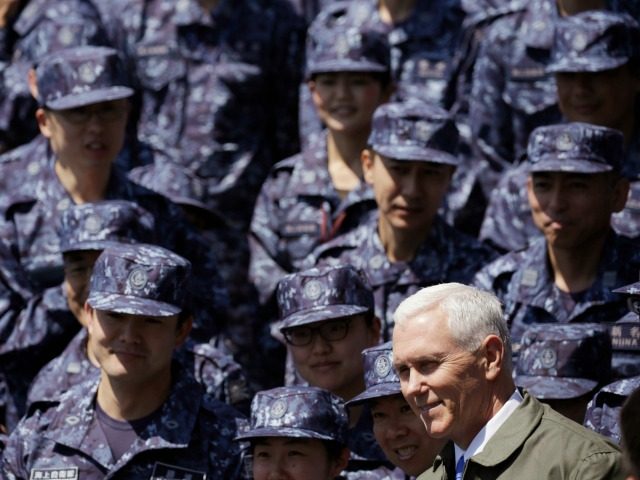From the deck of the USS Ronald Reagan as it sat alongside Yokosuka Naval Base in Japan, Vice President Mike Pence commended military troops with a message from the president, in the same speech bringing robust affirmation of the United States’ commitment to longtime ally Japan.
Pence brought the message from their Commander-in-Chief, President Donald Trump to the troops – “he’s proud of you” – and to thank them for their service.
“The United States-Japan alliance is the cornerstone of peace, prosperity, and freedom in the Asia Pacific,” said Pence. He affirmed the U.S. commitment to her longstanding relationship with Japan.
The vice president spoke of Japanese Prime Minister Shinzō Abe’s trip to the U.S. and visit with the President:
As the President and the Prime Minister made clear, the United States will strengthen its presence in the Asia-Pacific. Japan will assume a larger role and responsibility in our alliance in the years ahead. And both of our nations will continue to expand our cooperation for our common defense.
Pence spoke of the U.S. commitment to article 5 of the U.S.-Japan Security Treaty, mentioning specifically U.S. defense of Japan’s claim to the Senkaku Islands. In early February, U.S. Secretary of Defense James Mattis also affirmed U.S. commitment to defend the islands in the East China Sea, according to CNN.
China has laid claim to the resource-rich but uninhabited islands, which they call Diaoyu, and quickly responded with such claims after Mattis’ comments.
Pence spoke of the 50,000 U.S. troops and 50,000 civilians and family members stationed in Japan and committed America to “continue to deploy more of our most advanced military assets to the region in the years ahead.” Pence added, “by the year 2020, this ocean will boast 60 percent of our Navy’s fleet. And the skies above already have F-35 Joint Strike Fighters flying for freedom.”
The vice president also spoke of U.S. military strikes on a military base in Syria and a strike on ISIS in Afghanistan with a warning to enemies:
In just the past two weeks, the world witnessed the strength and resolve of our new President in the decisive action that he took in Syria and Afghanistan. The enemies of our freedom and this alliance would do well not to test the resolve of this President — or the capabilities of the Armed Forces of the United States of America and our allies.
He continued speaking directly to activity in the South China Sea – where China has also laid claims to territory belonging to five other nations – claims rejected by the international legal system in a July 2016 verdict.
Together, we will defend the rules-based order upon which the region’s progress, past and future, depends. We will protect the freedom of navigation and overflight and other lawful uses of the sea, in the South China Sea and elsewhere, and we will ensure the unimpeded flow of lawful commerce on the Seven Seas.
The vice president traveled to what he called the “front lines of freedom” at the demilitarized zone of the Korean Peninsula on Monday. He reiterated a portion of the message delivered there to U.S. and Republic of Korea military troops, that when it comes to North Korea, the “era of strategic patience is over.”. He said those troops “know what you who stand in the gap in this region already know – North Korea is the most dangerous and urgent threat to the peace and security of the Asia Pacific.”
Pence said of North Korea:
For more than a generation, North Korea’s leaders have sought to develop nuclear weapons and the ballistic missiles on which to deliver them. They have impoverished their people and embittered the region in their pursuit of this dangerous goal. For more than two decades, from the Agreed Framework of 1994, the Six-Party Talks from year 2003 to ’09, to the strategic patience of the recent past, the United States and our allies have worked to tirelessly to peacefully dismantle North Korea’s nuclear program and alleviate the suffering of its people.
But at every step of the way, North Korea answered our overtures with willful deception, with broken promises, and nuclear and missile tests — including a failed missile test they attempted just this past Sunday.
The vice president expressed the U.S. desire to work with allies Japan, China and “the wider world” to wield “economic and diplomatic pressure to bear on the regime in North Korea, and we will do so until they abandon their nuclear and ballistic missile programs.”
He then pivoted to say:
But as all of you know, readiness is the key. And you, the instruments of American policy, should know — all options are on the table. History will attest, the soldier “does not bear the sword in vain.” And those who would challenge our resolve or our readiness should know: We will defeat any attack and meet any use of conventional or nuclear weapons with an overwhelming and effective American response.
The vice president made clear from aboard “America’s flagship” as it sat docked in Japan, “The United States of America will always seek peace, but under President Trump, the shield stands guard and the sword stands ready.”
Follow Michelle Moons on Twitter @MichelleDiana

COMMENTS
Please let us know if you're having issues with commenting.